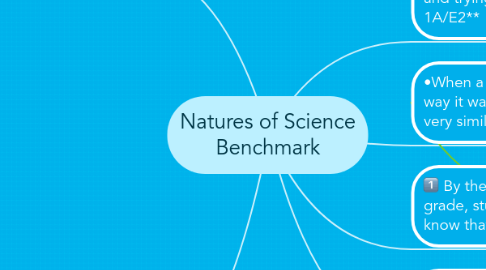Natures of Science Benchmark
by Brandy Jeter


1. By the end of the 8th grade, students should know that
1.1. •When similar investigations give different results, the scientific challenge is to judge whether the differences are trivial or significant, and it often takes further studies to decide. 1A/M1a
1.2. •Even with similar results, scientists may wait until an investigation has been repeated many times before accepting the results as correct. 1A/M1b
1.2.1. New node
1.3. •Scientific knowledge is subject to modification as new information challenges prevailing theories and as a new theory leads to looking at old observations in a new way. 1A/M2
1.4. •Some scientific knowledge is very old and yet is still applicable today. 1A/M3
1.5. •Some matters cannot be examined usefully in a scientific way. Among them are matters that by their nature cannot be tested against observations. 1A/M4ab*
1.6. •Science can sometimes be used to inform ethical decisions by identifying the likely consequences of particular actions, but science cannot be used by itself to establish that an action is moral or immoral. 1A/M4c*
2. By the end of the 12th grade, students should know that
2.1. •Science is based on the assumption that the universe is a vast single system in which the basic rules are everywhere the same and that the things and events in the universe occur in consistent patterns that are comprehensible through careful, systematic study. 1A/H1*
2.1.1. Sub task
2.1.2. Sub task
2.1.3. Sub task
